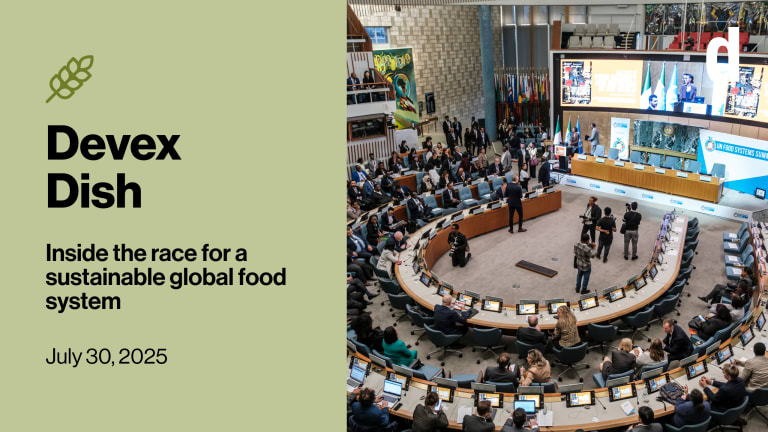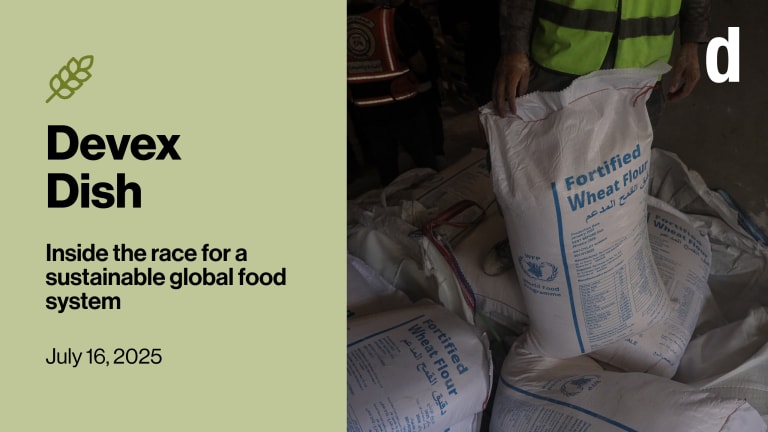Devex Dish: Is the process of declaring a famine broken?
In this week's edition: a dive into the technicalities involved in the declaration of famine and the consequences of a delayed declaration; a record-breaking allocation to fight famine; and a chat with CGIAR’s new livestock chief.
We’ve been talking a lot about potential famine in Somalia in Dish recently, and some experts are worried that’s all the international community is doing — talking. This while tens of thousands could die before an official famine declaration is made, losing time and an opportunity to avert the worst before official criteria are met. During Somalia’s last famine in 2011, studies show that half of the 260,000 victims had already died by the time famine was declared. The World Food Programme’s Arif Husain argues that we need a process that takes hours, not weeks, to address one of the growing causes of famine: war. This makes it difficult to gather the data required for an official declaration, he says. Others say the current highly technical — and therefore slow — process is necessary to avoid politicization, which Devex has reported evidence of in the past. But some of those also say that there is too much focus on famine, and not enough on the preceding stages of food insecurity, classified as “crisis” and “emergency.” This means cash is only made available when a situation becomes critical, as opposed to merely very urgent. They say donors need to intervene much more forcefully when hunger starts to be a widespread problem, to prevent a famine from ever occurring. And they say the community must get much better at asking for this to happen. Have a read of Devex contributing reporter Sophie Edwards’ story, and then let me know what you think: Is the famine process so technical that lives are being needlessly lost in the name of bureaucracy? Or is the process needed to avoid political meddling? Write to me at dish@devex.com. Read: Are slow famine declarations costing lives? (Pro) + Not a Devex Pro member yet? Start your 15-day free trial of Pro today to read the piece. Explore our on-the-ground visual story: 'The cavalry hasn't arrived' — Somalia on the brink of famine Lending a hand There’s also positive news for Somalia this week: The country can finally receive investments from the International Fund for Agricultural Development after four countries paid off its debt to the organization. That debt had prohibited IFAD from lending to Somalia despite the country’s dire food security situation. Somali President Hassan Sheikh Mohamud said the debt clearance represented a “new dawn” for Somalia as it attempts to move from humanitarian to development financing. “The reengagement of IFAD is the beginning of that transition. That helps a lot,” Mohamud told reporters in Rome. “It’s opening a door that the other partners, the other international organizations will follow suit.” Read: Somalia debt clearance paves way for IFAD investment amid drought Background reading: At COP 27, Somalia was on a mission to rebrand itself (Pro) The ‘super cow’ scientist Last week I shared everything I learned about how increasing climate resilience among livestock has vital implications for the future of the world to feed itself. This week Devex contributing reporter David Njagi sat down with professor Appolinaire Djikeng, the newly appointed director general at the International Livestock Research Institute and senior director of livestock-based systems at CGIAR, to talk about how he intends to transform the livestock sector. Unsurprisingly Djikeng — the first African to hold this position — says that when he takes office in March, genome editing will be part of the toolbox of innovations that he plans to bring to the table to respond to climate change. In 2021, he was part of a research team developing a “super cow” through gene editing. According to him, genome editing of certain breeds boosts the animal’s resilience to diseases and heat stress. Djikeng’s passion for agriculture and livestock systems developed while he was growing up in Cameroon. He tells David that coming from a community that keeps livestock as part of the local food system opened his eyes to what he could do to impact and improve the livelihoods of his people and other struggling smallholder farmers. Read: Livestock farmers are under threat — enter the 'super cow' scientist ICYMI: How drought-resistant livestock can help farmers fight climate change From your mouth In last week’s edition I also asked you how you were seeing climate change affect animals where you live. Lennity Gakii of Meru, Kenya, said in many areas, farmers are only able to sell cattle and goats at low prices because they can’t afford to feed the animals. Hay is expensive and often not available locally, so livestock aren’t getting enough to eat, which leads to low milk production. Here comes the SUN The U.N. secretary general has finally announced the appointment of a coordinator for the Scaling Up Nutrition, or SUN, Movement to replace Gerda Verburg, who left in December. Afshan Khan is currently UNICEF regional director for Europe and Central Asia, as well as the special coordinator for the refugee and migrant response in Europe. While she has decades of United Nations experience, Khan hasn’t held any specific food or nutrition roles — as opposed to Verburg, who had held several U.N.- and Dutch-specific nutrition roles prior to joining SUN. An exact start date hasn’t yet been announced, but I look forward to bringing you an interview with Khan when she’s settled in. Read: UN names UNICEF veteran to lead Scaling Up Nutrition Movement Number munching $250 million --— That’s the record-breaking amount that the U.N. has allocated to help the world’s most vulnerable people stave off famine. The funds from the United Nations global emergency fund will help people in 19 countries. This includes eight countries — Afghanistan, Burkina Faso, Haiti, Mali, Nigeria, Somalia, South Sudan, and Yemen — where more than 20 million people are just one step away from famine. In memoriam Former WFP Director Jim Ingram, the last non-American to lead the agency, died last week at age 94. The Australian served two terms and is credited with shifting WFP’s focus from development to emergency humanitarian work, according to a message announcing his passing that was sent to alumni of the agency. Why else was Ingram’s leadership significant? Catherine Bertini, who led the agency after Ingram, wrote to my colleague Colum Lynch: “He is the person who [led] the governance battle to separate WFP from FAO to be able to make its own decisions,” Bertini said. “This new authority is how I could make all the reforms that we did which was what became WFP of today and for which I won the World Food Prize.” Chew on this United States senators have reintroduced a bipartisan bill that would waive outdated U.S. shipping requirements for emergency food aid. [Senate Foreign Affairs Committee] Scientists and the Ojibwe people, a Native American tribe, are blending traditional ecological knowledge with Western science to save indigenous wild rice in the Upper Midwest. [FERN] Updated country nutrition profiles show increasing trends across Africa in anemia, overweight and obesity, raised blood pressure, and type 2 diabetes. [Global Nutrition Report] Rumbi Chakamba contributed to this edition of Devex Dish.
We’ve been talking a lot about potential famine in Somalia in Dish recently, and some experts are worried that’s all the international community is doing — talking. This while tens of thousands could die before an official famine declaration is made, losing time and an opportunity to avert the worst before official criteria are met. During Somalia’s last famine in 2011, studies show that half of the 260,000 victims had already died by the time famine was declared.
The World Food Programme’s Arif Husain argues that we need a process that takes hours, not weeks, to address one of the growing causes of famine: war. This makes it difficult to gather the data required for an official declaration, he says.
Others say the current highly technical — and therefore slow — process is necessary to avoid politicization, which Devex has reported evidence of in the past.
This article is free to read - just register or sign in
Access news, newsletters, events and more.
Join usSign inPrinting articles to share with others is a breach of our terms and conditions and copyright policy. Please use the sharing options on the left side of the article. Devex Pro members may share up to 10 articles per month using the Pro share tool ( ).
Teresa Welsh is a Senior Reporter at Devex. She has reported from more than 10 countries and is currently based in Washington, D.C. Her coverage focuses on Latin America; U.S. foreign assistance policy; fragile states; food systems and nutrition; and refugees and migration. Prior to joining Devex, Teresa worked at McClatchy's Washington Bureau and covered foreign affairs for U.S. News and World Report. She was a reporter in Colombia, where she previously lived teaching English. Teresa earned bachelor of arts degrees in journalism and Latin American studies from the University of Wisconsin.








